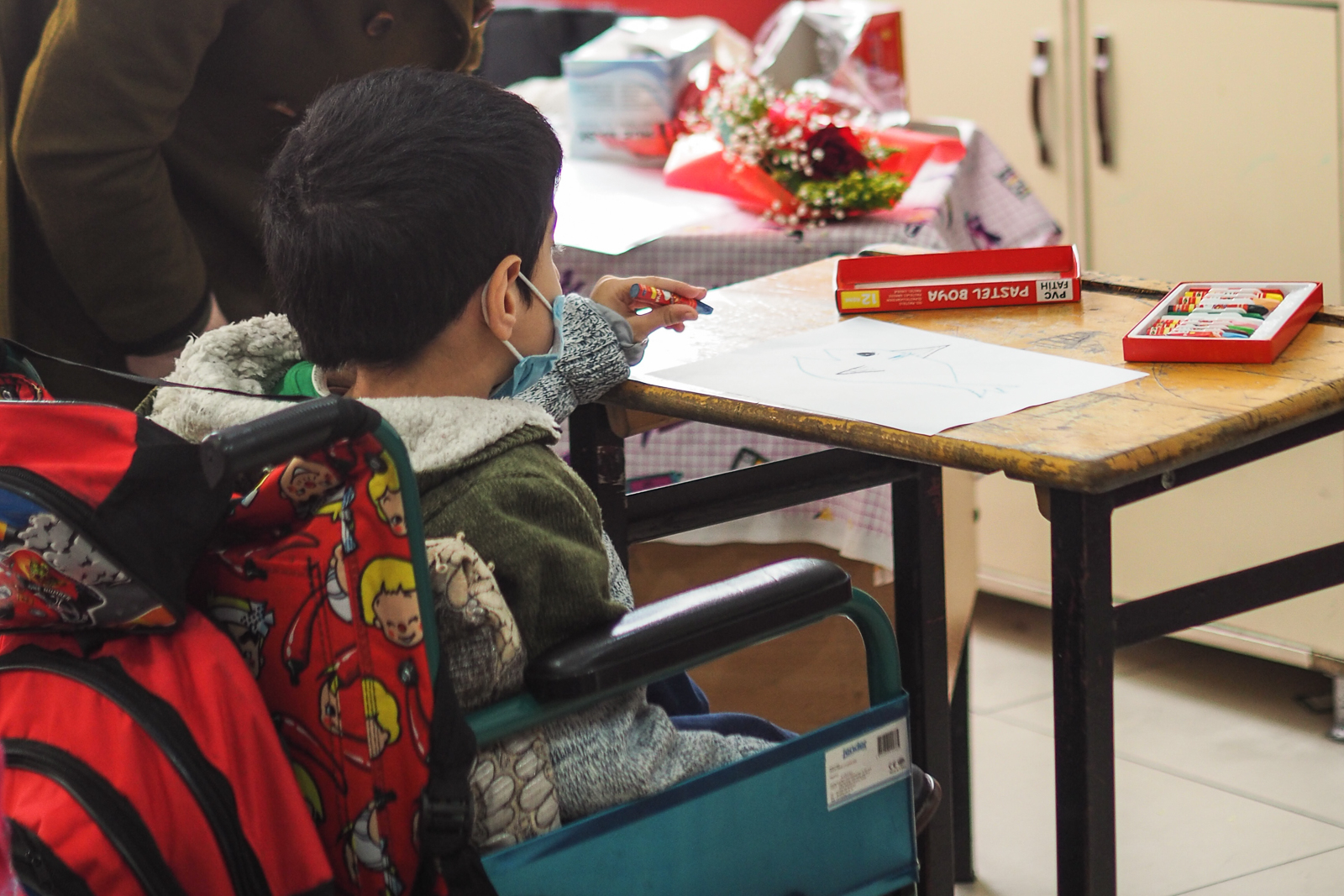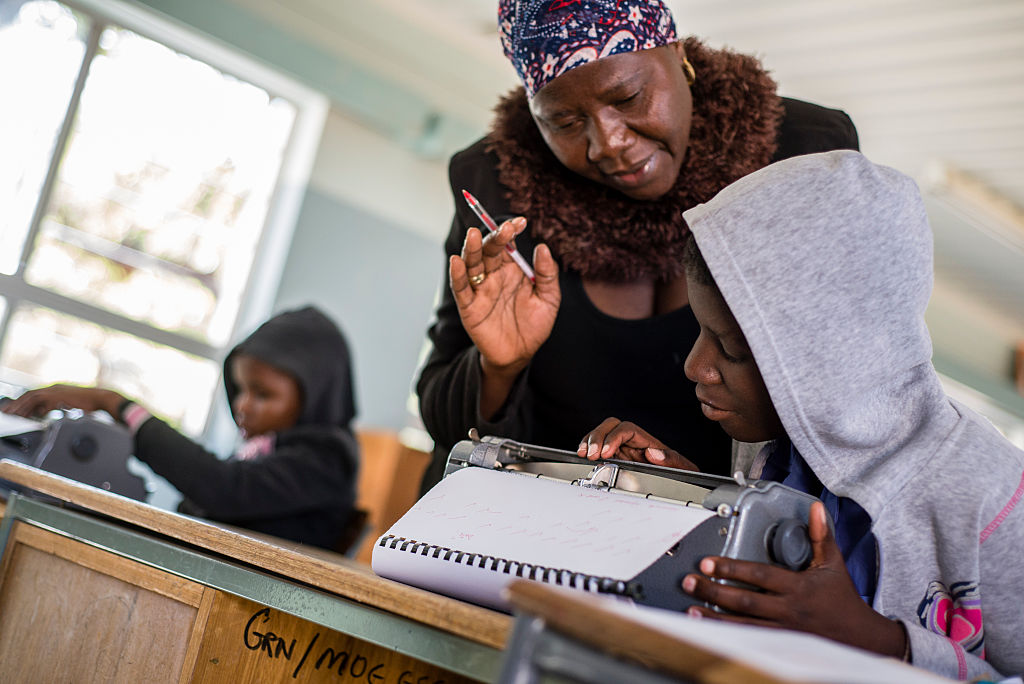
Left behind from the start: urgent action needed for young children with disabilities
Children with disabilities, Early childhood development, Right to education
Ahead of the Global Disability Summit in London, we look at some of the challenges and solutions in helping children to fulfil their potential.
- On July 24, the United Kingdom government will co-host its first Global Disability Summit with the International Disability Alliance and the government of Kenya. It will bring together more than 700 delegates from governments, donors, private sector organisations, charities and organisations of persons with disabilities.
- Young children with disabilities are particularly vulnerable. In the run-up to the summit, Their News is looking at the challenges they face and what’s being done in different parts of the world to provide them with nurturing care and education.
Six-year-old Victor doesn’t speak. He has Down’s syndrome and lives in Kenya, where children with special needs often face rejection and a life without education and opportunities.
“The problem is there is no special school here. Victor would have to go to Nairobi but obviously I can’t afford that,” said his mother Mary Wairimu.
Kenya’s capital city is nearly 400 miles from their home in Lodwar, Turkana County, in the northwest of the country.
“There is no speech therapist in Lodwar. That’s also a big problem for us,” said Wairimu.
“Victor is six years old and he doesn’t utter a word. If you take a four-year-old to Kenyatta National Hospital [the biggest referral hospital in Kenya and East Africa], even if the child has Down’s syndrome, they can talk. He needs speech therapy.
“He tries to express himself. When he’s thirsty he croaks. I try to teach him some words but it’s difficult because I’m short on time. I’m also trying to run a business selling fish, because this is what pays for the medicine he needs.”
Victor’s plight is not unusual in Kenya, where one in 10 young people under the age of 21 is disabled. Charities and organisations are working hard to overcome the stigma of having a child with disabilities or special needs.
But these obstacles are not confined to Kenya – they’re a global issue. Millions of children with disabilities are being left behind from a very young age – particularly when it comes to early learning and education.
Too many under-fives are failed by their governments and international donors, who need to invest urgently in early interventions for disabled children and provide inclusive, quality pre-primary education. If they don’t, these children will be condemned to a lifetime of disadvantages.
Theirworld believes governments and donors should significantly scale up their support for children with disabilities in their first five years – including access to early learning and quality pre-primary education.
Theirworld Campaigns Director Ben Hewitt said: “The evidence and experience of children with disabilities show that exclusion and discrimination starts at a very young age.
“It is particularly clear when children living with disabilities are excluded from pre-primary education in so many countries around the world. It is vital that two years free pre-primary is provided to every child and we see a quality and inclusive education for all.
“This will require the big international donors and domestic governments to step up their funding and action, as well as new funding from the proposed International Finance Facility for Education – a plan to generate an additional $10 billion for education.”
In many Kenyan communities, people believe that disability is caused by evil spirits or is a curse on their families. As a result, many young children are abandoned and left to die – and those who survive are often shunned or hidden.
It’s very hard when my youngest child doesn’t understand why he’s not going to school or speaking, when his younger sister is. Mary Wairimu, mother of Victor
In March, a report by the Kenya Institute of Special Education and the Ministry of Education revealed the country’s education system is still ill-equipped to support learners with disabilities and special needs.
Sadly, 16% of children with disabilities are out of school in Kenya. The international charity Save the Children is among those battling against the tide of discrimination to give children with special needs access to education and good healthcare.
“Among some of the most marginalised and excluded groups in society, children with disabilities face daily discrimination that prevents them from realising their rights to education, healthcare and survival,” said Jane Mbagi Mutua, Save the Children Kenya’s Director of Programme Development and Quality.
“Most communities hold beliefs that disability is caused by evil spirits or a curse from the gods. Children and adults with disability are kept at home and prone to miss opportunities such as schooling and health due to these entrenched social stigmas.”
Kenya does have policies in place for children with disabilities – but not the mechanisms to make them work. This leaves children with special needs and disabilities without access to free, quality basic early childhood and school education.
Save the Children has been working for three years in Turkana County to raise awareness of the rights of children with disabilities, tackling community perceptions and removing barriers to education for children with disabilities.
Mutua said: “We are building health and nutrition teams to identify and refer children with disabilities, equip health facilities, provide training on corrective procedures, and provide surgical and rehabilitative support to children.
“Plus we are advocating for accountable county budgets for children with disabilities and effective implementation of laws.”
That has resulted in a new disability act in Turkana that commits 1.5% of the county budget to disability programmes.
The organisation has forged a vital partnership with the ministries of health, education and social services. This includes bringing about ways of supporting early intervention and ensuring that education and child protection become the norm for disabled children.
Disabled children around the world face negative attitudes, inequality, exclusion and even violence virtually from the moment they are born.
Early detection of disabilities through quality early childhood development offers the opportunity to identify children who may have undetected developmental delays. This means they can get appropriate support and access to vital information.
In Turkana County, Jane Mbagi Mutua said: “One sub-location has increased the number of children identified with disabilities by 97% due to health worker training. Identification is the first step to referral and then support.”
The charity’s ”From Exclusion to Inclusion” initiative in Turkana County has made important progress but more needs to be done. Among the goals is helping school systems cope with increased enrolment of children with disabilities.
“We want children with disabilities to have access to their rights,” said Mutua.
That would help Victor and his mother Mary Wairimu. He needed physical therapy to learn to sit without his head flopping – but now he can ride a bike and climb steps on his own.
“It’s hard even to get the therapy,” said Wairimu. “Because if you go to the centre on a Monday, there are 20 mums waiting to have a go on the walking frame. You can be there eight or even 12 hours waiting for a turn.

“I’ve got two boys and two girls. Victor is the third born. He takes all my time. Even if I could afford to send him to a special school far away, he’d be traumatised. So would I. We shouldn’t be apart.
“It’s very hard when my youngest child doesn’t understand why he’s not going to school or speaking, when his younger sister is.”
Dr Joesph Bulimu, an occupational therapist in Lodwar County, said: “The disability project has succeeded in reducing stigma and many parents have brought their children out for treatment, having previously hidden them away.
“Mary heard about the therapy available for Victor on one of the project’s radio shows.
“We need the national government to take disability seriously and ensure services are available to disabled children across Kenya.”
Theirworld’s #5for5 campaign and our work on early childhood development is supported by the Conrad N. Hilton Foundation.
ALSO IN OUR SERIES
More news

Technology has the power to expand education for children with disabilities
